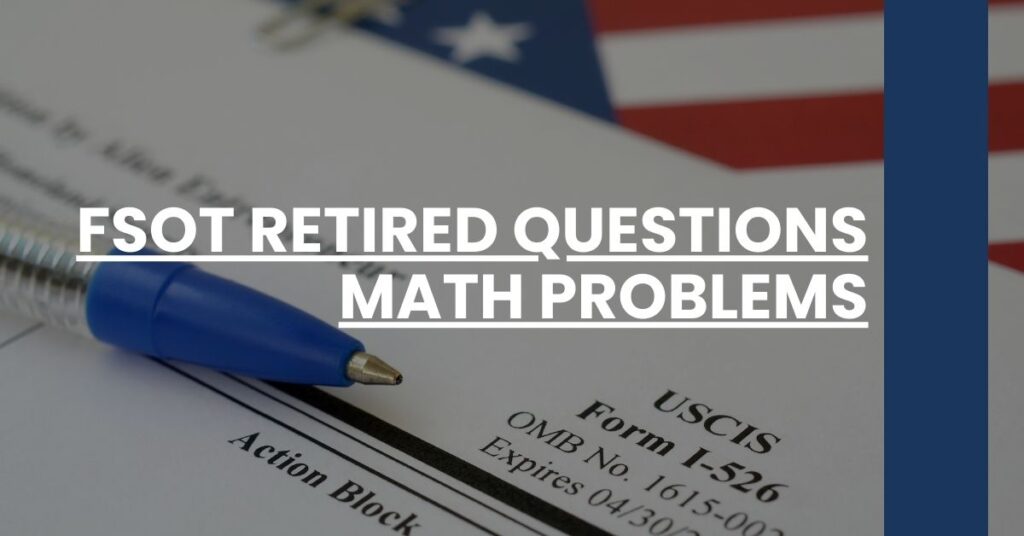FSOT retired questions math problems provide valuable practice for those preparing for the mathematical segment of the Foreign Service Officer Test. These problems are an authentic peek into the past assessments, enhancing readiness for the actual testing experience.
In this article, we tackle:
- The essence of retired FSOT math questions
- Tips for answering FSOT math problems effectively
- Reliable sources where you can find similar practice questions
So, if you’re querying how to best prepare for this part of the FSOT, rest easy knowing that practice with retired math problems is a strategic step towards success.
- Understanding the FSOT and Its Components
- The Nature of Retired FSOT Questions
- Why Math Problems Are a Focus for FSOT Candidates
- Exploring Sample FSOT Math Questions
- The Importance of Practice with Retired Questions
- Sources for Retired FSOT Math Questions
- Strategies for Tackling FSOT Math Questions
- Understanding Scoring for Math Questions on the FSOT
- Additional Resources Beyond Retired Questions
- Adapting to Recent FSOT Changes
- Conclusion: Maximizing Your FSOT Math Score
Understanding the FSOT and Its Components
When embarking on the journey to join the ranks of U.S. diplomats, one critical hurdle stands before you—the Foreign Service Officer Test (FSOT). A standardized test administered by the U.S. Department of State, the FSOT is your gateway to becoming a Foreign Service Officer (FSO). This comprehensive exam assesses your knowledge, skills, and abilities across several domains, each crucial to diplomatic work.
The Structure of the FSOT
The FSOT comprises four main components:
- Job Knowledge: This tests a range of topics you’ll need to be familiar with as an FSO, including U.S. government and constitution, world history and geography, economics, and communication.
- English Expression: As clear and effective communication is essential, this section evaluates your grammar, writing, and editing skills.
- Situational Judgment Test: Here, you are presented with hypothetical scenarios and asked to select the best response from a set of options.
- Essay: You must craft a well-founded essay on a provided prompt, showcasing your ability to organize and express ideas clearly.
Math is an important element of the Job Knowledge section, requiring a solid grasp of math principles and data analysis to thrive. Approximately 60 questions are allotted to this section, which entails an array of subjects, math being one of them. For a more extensive exploration of the FSOT’s structure and content areas, learn more here.
Due to the breadth and depth of the content covered, the FSOT can seem daunting, but with meticulous preparation, tackling it head-on becomes feasible.
The Nature of Retired FSOT Questions
Think of retired FSOT questions as a glimpse into the recent past. These are questions that were once part of the actual FSOT but have been retired from active duty to aid future test-takers like yourself. They’re no longer used in the test but provide valuable insights into the types and formats of questions you might encounter.
Significance of Retired Questions for Preparation
- Familiarity: These questions help you become accustomed to the FSOT’s style and difficulty level.
- Benchmarking: They allow you to measure your proficiency in various subjects.
- Focused Study: By working through these retired questions, you can identify areas where you need additional practice.
For those whose eyes are set on conquering the math section, retired FSOT math problems can be particularly intriguing. They serve as a concrete foundation for what to expect and allow you to hone your numerical and analytical skills.
Why Math Problems Are a Focus for FSOT Candidates
Why does math induce such a stir among FSOT candidates? It’s because math is more than just numbers; it’s a way of thinking, a language that describes how much, how many, and how likely.
Math in the FSOT Context
- Problem Solving: The FSOT’s math portion assesses your ability to apply mathematical concepts to solve problems—crucial for logical decision-making in diplomacy.
- Statistical Analysis: Understanding and interpreting data is a part of everyday responsibilities for an FSO. Hence, a solid grip on statistical concepts is essential.
- Time Management: With a tight time frame for the test, it’s also about how quickly and accurately you can work through the math problems.
With these challenges in mind, it’s clear why many aspiring FSOs pay particular attention to mastering math problems, often seeking out FSOT retired questions math problems to ensure they’re well-prepared.
Exploring Sample FSOT Math Questions
Imagine stepping into the math section of the FSOT with confidence, having practiced diligently with sample questions. The math problems you might encounter can cover diverse topics ranging from arithmetic to more complex statistical analysis.
Types of Math Problems to Expect
- Basic Arithmetic: Fractions, percentages, and ratios.
- Algebra: Equations, inequalities, and interpreting algebraic expressions.
- Data Interpretation: Graphs, tables, and pulling insights from data sets.
- Probability and Statistics: Understanding chances, averages, and variability.
Scouring through reputable FSOT preparation resources, you’ll find that sample math questions are built to reflect real-world applications, challenging you to think critically and analyze data effectively.
The Importance of Practice with Retired Questions
In the realm of high-stakes testing, practice is not just beneficial—it’s essential. By working through retired FSOT math problems, you immerse yourself in the testing environment, adopting strategies and honing skills with every question you tackle.
How Practice Leads to Success
- Improved Accuracy: Continual practice can refine your ability to zero in on the crucial details of each math problem.
- Speed: As you work through these questions, your speed in recognizing and solving various types of math problems will naturally increase.
- Confidence: A byproduct of practice is confidence, a subtle yet powerful ally that can impact your overall performance on test day.
Incorporating retired FSOT math problems into your study regimen can dramatically lift your preparedness, giving you the upper hand in achieving a commendable score. However, sources for these invaluable materials need to be legitimate and authoritative.
In the next section, we’ll delve into where you can find these retired questions, ensuring that the time you invest in practicing is built upon a solid foundation of quality resources.
Sources for Retired FSOT Math Questions
Navigating the sea of preparation resources for the FSOT can be a challenge. You want to focus on materials that are as close to the real thing as possible. That’s why retired FSOT math questions are such a treasured resource.
Here’s where you can look for these golden nuggets:
- Official State Department Resources: Although direct access to retired questions is not generally available, the U.S. State Department occasionally releases sample questions. Keep an eye on their official site for potential releases or announcements.
- Study Guides and Prep Courses: Specific programs are designed to reflect the FSOT’s format, with Mometrix offering a wealth of preparation materials. While not official retired questions, these resources are created to mimic the exam’s rigor.
- FSOT Prep Apps: There are mobile applications devoted to FSOT preparation, which might contain sets of retired or sample questions to practice with. The “DOSCareers” app is an example where you can find such questions.
When working with retired questions, note that the FSOT continually evolves, so always seek out the most current material. Although the exact retired questions are not at your disposal, these resources will give you a solid grounding in tackling the sort of math problems you’re likely to face on the test.
Strategies for Tackling FSOT Math Questions
Approaching the math problems on the FSOT can be daunting, but with the right strategies in hand, you’ll navigate them more effectively. Here’s how to make the most of practicing with fsot retired questions math problems:
- Understand the Concepts: Before diving into practice questions, ensure you have a strong grasp of foundational mathematical concepts. You don’t just want to memorize procedures but understand the reasoning behind them.
- Create a Study Plan: Like an intricate diplomatic strategy, your study regimen should be comprehensive and structured. Allocate regular time slots for working through math problems.
- Simulate Testing Conditions: Practice under timed conditions and in an environment similar to the test center. This acclimatization can make a significant difference in how you manage stress and fatigue on the actual test day.
Remember, consistent practice with materials like those offered by FSOT prep courses builds familiarity—not just with math problems but with the FSOT’s unique questioning style.
Understanding Scoring for Math Questions on the FSOT
As any diplomat knows, it’s not just the actions you take but the outcomes that matter. Similarly, it’s crucial for you to know how the FSOT scores your math answers. Although the exact scoring mechanism for the FSOT’s math section is not publicly disclosed, here are general principles that hold true:
- Accuracy Counts: Each correct answer typically adds points to your score, so accuracy is key.
- No Penalty for Guessing: You’re not penalized for incorrect answers, which means it’s better to take an educated guess than to leave a question blank.
By practicing with similar test questions, you familiarize yourself with the precision required in the actual exam. Address your weak points based on feedback from these practice sessions to improve your accuracy and ultimately, your FSOT math score.
Additional Resources Beyond Retired Questions
While fsot retired questions math problems are a stellar tool, they should only be part of your arsenal. Here’s how you can bolster your math preparation:
- Online Learning Platforms: Websites like Khan Academy offer free resources that can solidify your understanding of mathematical principles.
- Study Groups: Joining or forming study groups allows you to benefit from the collective knowledge and support of peers who are also preparing for the FSOT.
- Math Books and Educational Materials: Don’t overlook traditional study aids. Math textbooks, especially those geared towards SAT or GRE preparation, can provide additional practice and explanation.
The more diverse your study materials, the broader your knowledge base will be. Make use of available resources and tailor them to suit your study style and schedule.
Adapting to Recent FSOT Changes
Staying abreast of the latest updates to the test’s format or content areas is crucial. The FSOT, like the field of international relations, is fluid and subject to change. Make sure to regularly check the U.S. Department of State’s website for the most recent information regarding the FSOT and its components.
Adjusting your study plan in response to any new updates will ensure that you’re not caught off-guard by adjustments to the math section or any other part of the FSOT.
Conclusion: Maximizing Your FSOT Math Score
Wrapping up this extensive look into fsot retired questions math problems, it’s essential to remember that your journey to mastering the FSOT’s math section is a marathon, not a sprint. Approach your preparation with diligence and adaptability, utilizing a mix of official resources, simulated practice, and additional study aids. Embrace the mindset of continuous learning and problem-solving that the FSOT’s math problems demand.
By doing so, you’ll not only be improving your FSOT math score but also developing invaluable skills that will serve you well in your career as a Foreign Service Officer. Keep informing yourself, practicing with purpose, and before you know it, you’ll be solving those math problems with the finesse of a seasoned diplomat. Good luck, and may your dedication to preparation open doors to a fulfilling career in the U.S. Foreign Service.
Unlock FSOT retired questions math problems: your key to preparing and excelling in the Foreign Service Officer Test’s challenges.

